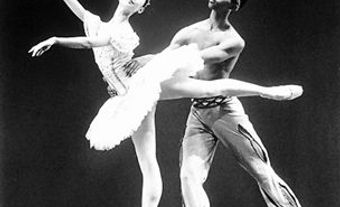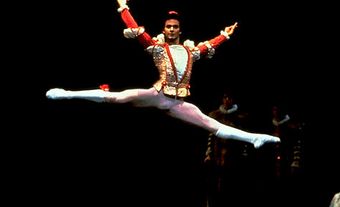PPS Danse
PPS Danse was founded 1989; originally Pierre-Paul Savoie Danse, the name was shortened to PPS Danse in 1991. The contemporary performance works of Pierre-Paul Savoie and co-artistic director Jeffrey Hall have captivated audiences across Canada for their athleticism, charm and humanistic outlook. The duo's interdisciplinary approach to dance performance combines operatic singing, theatrical characterizations and texts, choreography, sculptural set, and innovative virtual reality imagery. The company's vital artistic collaborators include Bernard Lagacé (scenography), Marc Parent (lighting design), Alain Francoeur (assistant choreographer), Ginette Bertrand (composer), Paule-Josée Meunier (costume design), Michel Lemieux (virtual reality imagery) and Victor Pilon (scenic projections).
Company founder and artistic director Joseph "Pierre-Paul" Savoie (b at Maria, Qué 14 Jan 1955) studied modern dance at Concordia University, theatre at the National Theatre School in Montréal, and singing with Phillippe Parent. As well as creating over a dozen performance works, he has performed in numerous Québec theatre and dance productions, and choreographed extensively for theatre, musicals, circus and performance art productions in Montréal. Savoie's prolific repertoire includes solo pieces like Tripes attisées (1987), a poignant study on crutches, the heroic Don Quichotte de la Tache (1988), and group works such as the Antichambre (1987) quartet and the experimental opera Ombre d'un doute (1992).
Jeffrey Lawton Hall (b at Ottawa 29 July 1958), Savoie's long-time collaborator, studied classical piano at McGill University, earned a BA in dance at Concordia University, and became a Canadian freestyle Frisbee champion. As well as creating 6 of his own choreographies, he has danced internationally with Jean-Pierre PERREAULT and the CARBONE 14 theatre company, and performed in the films Le Dortoir (directed by François Girard) and Café des Aveugles (directed by Michel Tousignant) - both film versions of productions by Carbone 14.
It was with the creation of Savoie and Hall's collaborative signature duet, Duodenum (1986), that the company received national recognition and began touring across Canada. This vivacious, cartoon-inspired duo explored the contemporary male psyche through the misadventures of two anti-heros, injecting a refreshing dose of humour and social criticism into Montréal dance. Two more duet works, created and performed by Savoie and Hall, followed: Bagne (1993), an athletic, emotionally charged study which evokes the imprisonment of both body and mind, complemented by the recreation of a female version (1998); and Pôles (1996), a dream-like meeting of 2 exiles in an imaginary world where body, soul, mind and motion interact with virtual projections to reinvent theatre. This triptych of men's stories, like on-going exploits in the saga of Savoie and Hall, lies at the heart of PPS Danse. In 2002, Strata (mémoires d'un amoureux) proposed a further chapter in the marriage of dance and technology, with its interactive sound environment designed by Äke Parmerud and visuals by Yves Labelle, in which an intergenerational quintet incarnates the passage of time.
In 2004 Savoie turned his attention to the backstage life of dancers with the creation of a series of 3 short dramatic dance pieces: Solosansfils, Extase and Louves. He then became interested in circus performers, composing a sextet that exploited their physical vocabularies, extended through vocal and theatrical techniques, in Danses Circassiennes (2005). In 2006 he created a first work specifically for young audiences, Les Flaques, an interdisciplinary choreography of poetic images in collaboration with Théâtre Bouches Décousues. In 2008 Savoie conceived a triptych of 3 short works called Diasporama, in which he danced as the central protagonist, evoking themes of displacement and exile: the solo ½ One Nor Two by himself; ...and the air felt like it would burst into flames by André Gingras, and The Telling Body by Luc Dunberry.
Hall and Savoie won the Jacqueline Lemieux Prize in 1996 for the creation of Bagne. At the awards ceremony they were cited for the integrity of their representation of the human condition.

 Share on Facebook
Share on Facebook Share on X
Share on X Share by Email
Share by Email Share on Google Classroom
Share on Google Classroom


